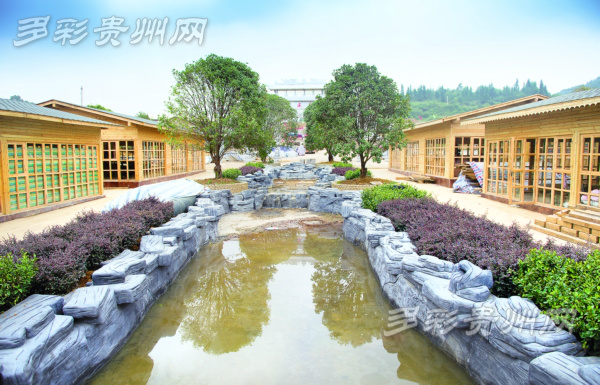By Tom McGregor, CNTV Panview commentator and editor
Editor's Note: CCTV.com Panview presents 'China Cares' — series of special coverage on China's rural reforms, charities and comprehensive efforts to help those in poverty unlock their potential for success.
The income disparity between rural residents and urban dwellers in China continues to haunt the nation. Hundreds of millions of farmers have departed from their villages to migrate to bigger cities for higher-paying jobs.
The huge tidal wave of migrants has led to severe over-crowding, deepening pollution and more societal ills in metropolitan areas, and the government hopes to persuade many of them to return home.
Such measures can ease pressures on the nationwide urbanization drive while restoring a fair economic balance between rural villages and cities. Some experts believe that a good start would be to boost rural tourism.
Developing tourist towns
A number of impoverished villages have taken steps to convert into tourist towns.
The Beijing Review reports that Xiushui village lies in Southern China’s Puding County, Anshui City of Guizhou Province with about 3,823 residents and 1,165 households.
Guizhou is one of the poorest provinces in the country, but surrounded by lush green forests, rolling hills and valleys that can lure in tourists.

(Scenery at Xiushui village Photo from the official website of Guizhou)
Local residents, officials and the Chinese company - Xingwei Group - are working together to rebuild the village with log cabin guestrooms that sit nearby the local stream.
Villagers have received more training to raise crops, plant nut trees and to serve in the hospitality industry. Visitors can enjoy sightseeing tours, go camping, horse riding and karting.
Rebuilding from scratch
"The villagers used to live in thatched cottages," Lu Qianqian, 20-year-old young woman resident, told Beijing Review. "We ate cornmeal and pickles, rarely meat."
She added, "On rainy days, the roads were slippery and difficult to walk on. But they are all things of the past now."
The changes have been dramatic. Before 2014, average annual per-capita income of villagers was around RMB2000 (US$305), but it has increased to RMB18,000 (US$2,748) in 2016.
A few years ago, Xiushui had over 453 households living under the national poverty line, but 295 households are now enjoying better times.
Xingwei Group Chairman Wang Wei founded his company in 1999, which is based in Anshun. He's a native of Xiushui and when he reaped in big-time financial rewards he wanted to give back to the community where he was born and raised.
Eco-friendly agriculture & tourism
Chairman Wei had assigned his corporate management team to develop a plan to remodel his hometown that would attract more tourists. He wanted to focus on eco-friendly agriculture and tourism.

(The rebuilt Xiushui village Photo from the official website of Guizhou)
Meanwhile, the All China Federation of Industry and the State Council Leading Group Office of Poverty Alleviation & Development had issued a report calling for more companies to develop rural tourism with a Green agenda in mind.
"The poverty alleviation is not a burden, but a development window for private companies," said Zhang Zuyu, assistant to chairman at Xingwei. "Business people should combine their interests with that of the general public."
Zhang believes China's sustainable development path - reducing poverty, upgrading living standards and following eco-friendly policies - should be welcomed by the entire business community.
Serving ethnic minority groups
Guizhou has long struggled under poverty, but the province remains home to 17 ethnic minority groups. The United Nations World Tourism Organization (UNWTO) has collaborated with provincial officials to support its rich ethnic culture.
In September 2006, the Chinese government, UNWTO and World Bank had signed a pledge, known as the ‘Guiyang Declaration,’ to promote ethnic cultural heritage by encouraging more design, production and marketing to include tourism and making handicrafts.
In 2006, the then-consultant at UNWTO, Tim Bartlett, hosted a seminar to introduce the Guiyang Declaration to the Chinese public. He contends that rural tourism could benefit ethnic minorities by utilizing Public-Private-Partnerships (PPP).
"Its remote mountains have prevented the ethnic population from losing their traditions, languages, unique food and clothing," said Bartlett.
Seasonal moods for tourism
"It's no easy task to balance a desire for economic development and heritage preservation," said Han Li, China director for Global Heritage Funds, a US-based NGO (non-government organization). "Heritage sites can bring income and development."
Han added, "Our challenge is to find a way to manage this process in a way that doesn't jeopardize the heritage and traditional way of life."
Despite such concerns, many farmers and ethnic minorities would prefer higher incomes and improved living conditions, since that’s the China Dream for them.
Rural tourism is bridging the divide and narrowing the income inequality gap in China, which serves as an effective strategy to bring more jobs and benefits to rural communities.
(The opinions expressed here do not necessarily reflect the opinions of Panview or CCTV.com. )

Panview offers a new window of understanding the world as well as China through the views, opinions, and analysis of experts. We also welcome outside submissions, so feel free to send in your own editorials to "globalopinion@vip.cntv.cn" for consideration.
















